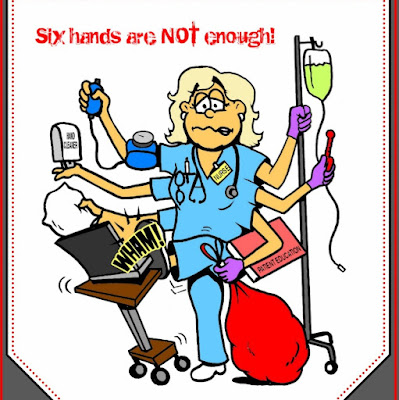Understanding Compassion Fatigue in Nursing
Understanding Compassion Fatigue in Nursing
Many people who go into nursing do it because they have a desire to help people. They start out compassionate and empathetic.
In the best scenario, nurses maintain their level of compassion and caring throughout their career.
Unfortunately, in some cases, the stressors of the job lead to a decrease in empathy, burnout and sometimes compassion fatigue.
If you are a nursing student or a new grad, it may seem too early to talk about compassion fatigue. But the earlier you recognize what compassion fatigue is and how it develops, you can take the steps necessary to prevent it.
What is Compassion Fatigue?
Compassion fatigue is a decreased ability to feel compassion and empathy towards your patients. It develops over time due to physical and emotional exhaustion from caring for the sick and injured.
Anyone who works in the medical field and provides direct patient care is at risk for compassion fatigue. But nurses tend to develop it at higher rates than other healthcare team members. This may occur because nurses often have the most direct patient care contact.
Although not everyone who works in healthcare has a decrease in compassion, it can be a common problem for many. According to a study published in the Journal of Emergency Nursing, anywhere from 15 to 85 percent of healthcare workers develop compassion fatigue at some point in their career. The more stressful the job, the higher the risk of developing the condition. For example, emergency room nurses tended to have higher rates of compassion fatigue than nurses in labor and delivery.
The consequences of compassion fatigue can affect patients, co-workers and nurses themselves. For example, the quality of care may be decreased when a nurse loses compassion. Even if you still provide the needed treatments and care, your lack of compassion may come across to the patient.
Have you ever worked with a co-worker who did nothing but complain? When a nurse develops compassion fatigue, they may be more likely to complain at work, not pitch in and call in sick. Compassion fatigue can also take a toll on a person’s wellbeing. It can lead to a lack of job satisfaction, anxiety and depression.
How Does it Develop?
If you start your nursing career with a desire to help people and have a compassionate attitude, how does it change? It is probably not one factor, which leads to a decrease in compassion. Instead, it is often a combination of things. For instance, continually dealing with large workloads can make any job in healthcare overwhelming. In some cases, nurses may have to deal with more than they can handle, which leads to rushing through tasks just to keep up. Human interaction and compassion often take a back seat to getting through the workload.
Another factor, which may lead to compassion fatigue is dealing with non-compliant and difficult patients. Dealing with rude or angry patients on a frequent basis can take its toll emotionally. Having supportive management and supervisors can help nurses cope with difficult situations.
Working too many hours can also increase a person’s risk of becoming burnt-out and losing compassion for their patient’s. Your current life circumstances also play a role in your ability to deal with the stress of caregiving. If you are having trouble in other areas of your life, such as financial or relationship issues, it can spill over onto your job.
Signs you May be Developing Compassion Fatigue
One of the best things nurses can do is recognize the signs of compassion fatigue before it leads to complete burnout. Some of the signs of compassion fatigue include those listed below.
- *Dread when coming to work
- *Anger
- *Anxiety
- *Decreased feelings of compassion
- *Loss of interest in your career
- *Inability to concentrate or make decisions at work
- *Disruption in home life
- *Increased use of alcohol or drugs
Prevention and Dealing with Compassion Fatigue
Whether you are still in nursing school or already working in the field, there are things you can do to prevent compassion fatigue from developing, such as the following:
Understand what compassion fatigue is: Some nurses have never heard of compassion fatigue. They may feel stressed out and have a decrease in patience, but they fail to realize what is going on.
Know the warning signs: Understanding that compassion fatigue can develop and recognizing the warning signs can help you get a handle on the situation before it escalates.
Check in with yourself: Life gets busy, and it is easy to rush through your day moving from one task to the next. Take a few minutes now and then to ask yourself how you are feeling. It can be difficult to admit you are starting to lose compassion, but it is essential if you are going to correct the situation. If you feel you have a problem, don’t just ignore it.
Develop stress relief strategies: Everyone is different when it comes to developing strategies to deal with stress. Some people exercise while others enjoy listening to music or getting a massage. Find healthy ways to recharge after work, such as hanging out with friends, spending time outdoors or pursuing a hobby.
Take time off when needed: Everyone needs a break from the demands of work. A car cannot run on empty and neither can a nurse. You need to replenish your body, mind and sprint by taking time away from work and doing things you enjoy.
Talk about how you feel: If you think you are developing compassion fatigue, don’t hesitate talking to someone about how you feel. Whether you talk with a trusted co-worker, friend or a professional counselor, it can help to discuss your feelings. Many healthcare facilities offer free counseling to employees to help them deal with both personal and work related issues.
Whatever you do, don’t just ignore the situation. When you lose empathy and compassion for your patients, it is difficult to provide the best care possible. In addition, your job satisfaction will likely decrease, which makes work less rewarding and more stressful.
By Jodie Price.






No comments:
Comments for this blog are held for moderation before they are published to the blog.
Note: Only a member of this blog may post a comment.